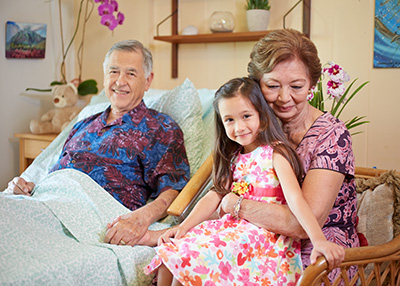- It’s common to have emotional ups and downs and mood swings for quite a while. One day you’re feeling that things are finally getting back to normal, and the next day you’re feeling down in the dumps again. Often the anniversary of a loved one’s death, seeing someone who looks like him, or visiting a familiar place will be enough to bring on depression.
- It’s important to learn to turn off the “if onlys.” Every bereaved person goes through a series of “if only I had” gotten him up sooner, gotten up to check on him, or covered him at midnight, etc. These thoughts have to be turned off or they continue to be upsetting. There is no prediction or prevention of death.
- Insomnia and bad dreams are common. Sleep is difficult but essential for the well being of the bereaved person and/or family. Sometimes a mild sedative will be prescribed by the family physician. Bad dreams involving death and the deceased are frequent and may be upsetting but seem to be a normal part of adjustment.
- Somatic complaints are frequent (stomach ache, heartache, etc.) and common. A bereaved person may comment that his/her stomach feels like it is tied in knots. Usually just knowing that others have these same feelings is comforting.
- It takes time to accept reality. Many grieving people continue to do what they used to do for the dead person. This is normal.
- It’s common not to want to be left alone. People who are grieving find it especially disturbing to be alone in the same house or apartment where the person died. Many ask a friend or relative to come and stay with them when the family is at work or away.
- It may be difficult to concentrate for any length of time. Grievers often feel they are going crazy because they cannot concentrate or do routine tasks they have done all of their lives. Reading is difficult because the mind seems to wander.
- Loss of appetite is common. People who are grieving eat because they know they must. It’s better to eat small amounts of easily digested food frequently rather than three large meals.
- Parents may become easily irritated by their children or other family members and yet be overly concerned for their welfare at the same time. Well-meaning, helpful friends and relatives may also irritate. Being irritated by friends and relatives often leaves the person feeling guilty for resenting those who are trying to help.
- Grief is expressed in many different ways. It’s quite normal for family members to express their grief in different ways, yet this is not always understood. Women generally need to talk out their grief, and any effort to block this may delay the grieving process. Men tend to keep their feelings more to themselves as society expects them to do.
- Children need help in adjusting to death in the family. Children are very aware of the emotional tone of the family and will be affected in some way by a death. The very small child (toddler) is too young for an explanation and merely needs a lot of love and affection for his own security. He may have some frightening thoughts that he cannot express. He may cling to his parents and do naughty things to get their attention. The older child may have his own guilty feelings and should be encouraged to talk about the death and the person whenever he wants to. Parents should be alert for any problem that might relate to the death: difficulty in school, reverting to bedwetting, nightmares, etc.
- It may be helpful to talk to another person who shares the same grief process.
This material was excerpted from: Margaret Pomeroy, RN, BS J. Bruce Beckwith, MD, of the National SIDS Foundation.



